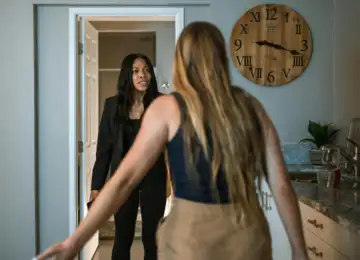As adults, apart from family, the two people who matter most are usually our best friend and our beau. They’re the ones we want to share everything with.
And in an ideal world, your partner and your BFF get along and vibe effortlessly, which means every outing turns into a slightly cringe but secretly adorable third-wheeling situation where you’re the one soaking up all the love.
But what happens when things go sideways, when your best friend starts flirting with your partner? It’s a nightmare scenario most of us hope we’ll never have to deal with, yet it happens more often than we’d like to believe.
Suddenly, you’re not just dealing with shock and anger, but also the painful question: can you really trust either of them? Do you call out your friend? Do you confront your partner? Do you try to save one relationship or risk losing both?
The situation can get messy, complicated, and emotionally draining. Here’s how to deal if you ever find yourself stuck in this storm.
Observe before you decide
Ruchi Ruuh, a Delhi-based relationship counsellor, tells India Today that even though the situation may feel like a betrayal, it’s important not to jump to conclusions.
“Sometimes, what feels like flirting may just be friendliness. Observe carefully how your partner reciprocates it, or do they look uncomfortable? Is your friend repeatedly crossing boundaries despite disinterest? These observations help distinguish between one-sided advances and a mutual situation,” she adds.
Dr Nisha Khanna, a Delhi-based relationship and marriage counsellor, also states that it’s important to notice what’s really happening-what was said, how it was said, who initiated it, and whether it’s a one-time incident or a recurring pattern.
 It’s important to figure out whether the flirting is one-sided or mutual | Photo: Pexels/Ivan SamkovYou should look for signs like late-night texting, unusual compliments, or physical closeness that feels inappropriate.
It’s important to figure out whether the flirting is one-sided or mutual | Photo: Pexels/Ivan SamkovYou should look for signs like late-night texting, unusual compliments, or physical closeness that feels inappropriate.
This observation will help you see what’s really going on between your partner and your best friend, and also give you clarity on whether it’s one-sided or mutual.
Begin the conversation at home
According to Dr Neetu Tiwari, senior resident, NIIMS Medical College and Hospital, Delhi, you should always talk to your partner first.
“Relationships are built on direct communication, not third-party speculation. Confronting the friend before your partner not only risks misunderstanding but also weakens your partnership,” she says.
She suggests approaching your partner gently, without accusation. Instead of ‘You are too close to them,’ try ‘I’ve been feeling uneasy about how close you and they seem lately. Can we talk about it?’
This shifts the conversation from blame to vulnerability. When you express your feelings, your partner has the chance to clarify, reassure, or reflect honestly.
To this, Dr Khanna adds that communication is a two-way street, and you should be open to hearing your partner’s perspective, too. The goal is to solve the problem, not attack each other.
Sometimes, your partner may not even realise their behaviour, or your friend’s feels like a boundary breach to you.
If your partner acknowledges the issue, work together on an action plan, whether that’s avoiding certain interactions, being more transparent, or limiting contact with the friend.
“Protecting your relationship is a human trait. This doesn’t mean being possessive, but creating a safe space where both partners feel secure. If your partner is trustworthy and committed, this situation can actually become an opportunity to strengthen your bond, by showing that you both choose each other over outside drama and other people’s advances,” adds Ruuh.
The tough chat with your friend
When it comes to your friend, the conversation should be direct but respectful.
Dr Khanna advises being honest about what you’ve noticed and how it makes you feel, without turning it into pure criticism. The tone doesn’t have to be harsh, but it should be firm enough to set boundaries clearly.
Spell out exactly what crossed the line for you, whether it’s late-night calls, private chats, or flirty comments, and explain why it hurts. Be specific about what behaviour is not okay moving forward.
If your friend tries to brush it off or minimise it, don’t let that slide. Stand by your feelings and make it clear this isn’t something you’ll tolerate. Even with a long-standing friendship, it’s important that they understand your limits and respect your relationship.
Friendships can be lifelong treasures, but they can also turn into subtle threats if boundaries are blurred. The key question is: Does this friendship nourish me, or does it undermine my relationship?
When it comes to deciding the fate of your friendship, it should depend on how your friend responds.
As per Ruuh, if they acknowledge their mistake and respect the boundaries you set, the friendship can continue. But if they dismiss your feelings, blame you, or continue to cross the line, it’s a sign that the friendship may not be healthy any more.
 If your friend can’t respect your boundaries, it’s best to take a step back | Photo: Pexels/RDNE Stock projectFuture red flags to keep in mind
If your friend can’t respect your boundaries, it’s best to take a step back | Photo: Pexels/RDNE Stock projectFuture red flags to keep in mind
- Secretive communication: Late-night calls, hidden texts, deleted chats, or defensiveness when questioned.
- Boundary crossing: Flirty comments, suggestive messages, unnecessary physical closeness, or excessive compliments directed at your partner.
- Undermining behaviour: Dismissing your relationship, making jokes at your expense, or constantly praising your partner while ignoring or demeaning you.
- Triangulation: Your friend confiding in your partner about your relationship issues or inserting themselves into conflicts between you two.
- Emotional intimacy shift: Your partner sharing details, seeking comfort, or forming a special bond with your friend that they no longer share with you.
- Persistent attempts at exclusivity: Repeatedly trying to spend time alone with your partner or creating inside jokes that leave you out.
The trust factor
Trust really is the deal-breaker here. Without it, even the most harmless chat can feel like a threat. If you’re doubting your partner, every laugh or message with your friend might set off alarms.
And if you’re doubting your friend, even a compliment can look like flirting.
The best way forward? Strengthen the trust in your relationship first, because when your bond is solid, outside distractions don’t hold as much power.
